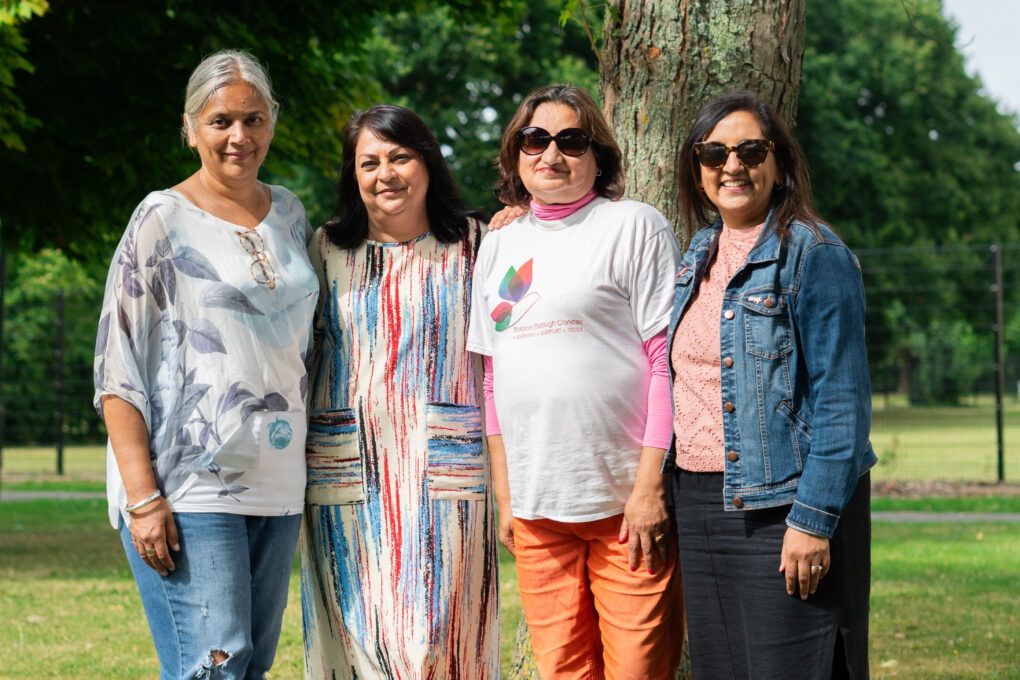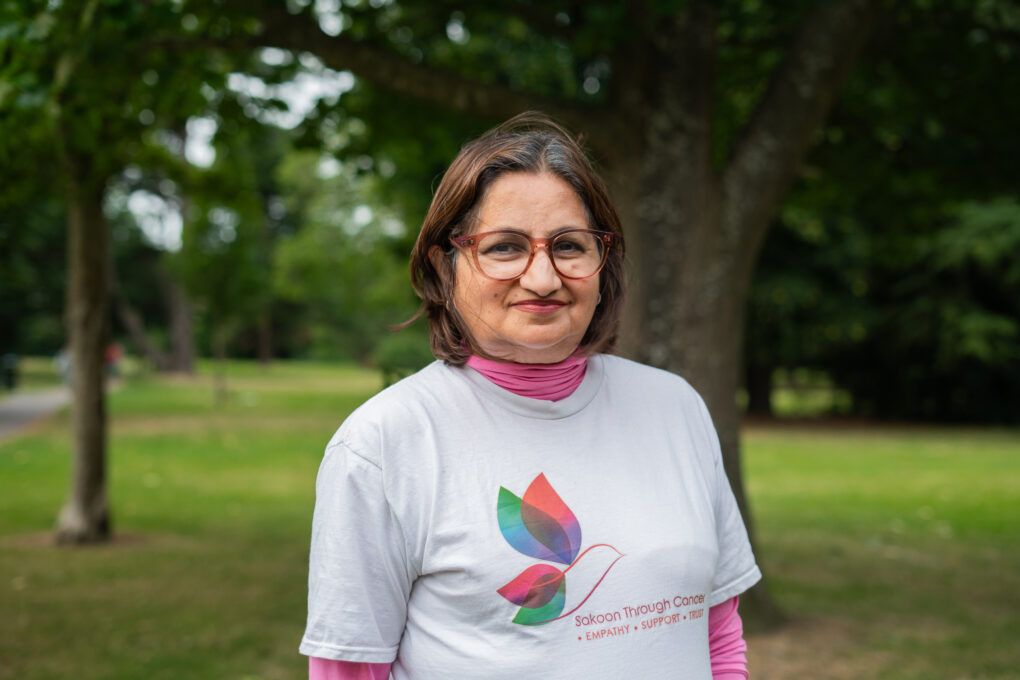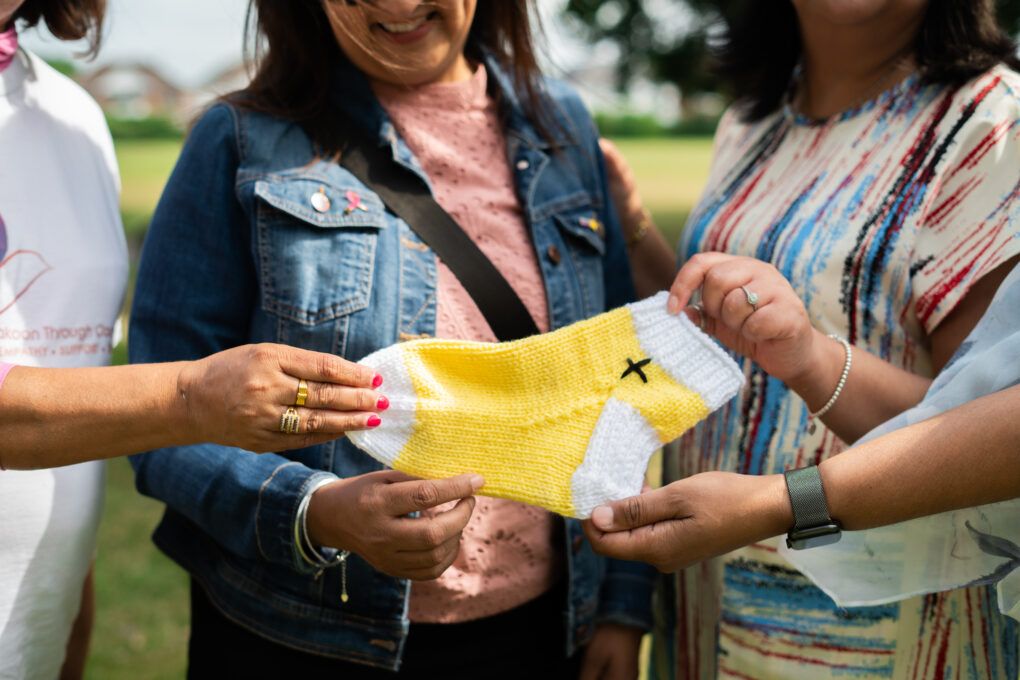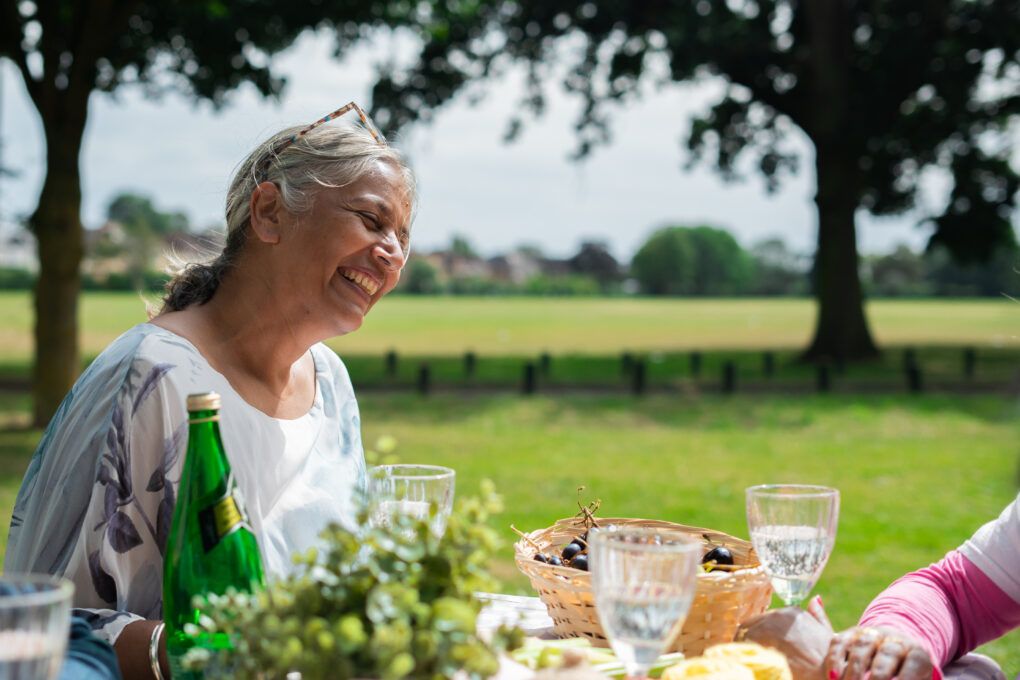‘Nobody should go through cancer alone’
“I named the group Sakoon Through Cancer, because sakoon means peace or tranquillity,” says Samina Hussain, who founded the support group in 2018 after her own breast cancer diagnosis. “When you’re going through cancer, you need to find a sense of peace within yourself.”
Gathered around the picnic table at a park local to the group in Slough, are four women. There’s talk about the shock of a cancer diagnosis as well as the side effects of chemotherapy, such as hair loss, brain fog and nerve damage.
But, as often happens when women get together, there’s also a lot of laughter and plenty of uplifting conversation. There’s sharing about families and grandchildren – Samina has a new granddaughter, bringing her to a total of 11 – midlife dating, delicious ways to eat healthier post-cancer, and discussion about the best local samosa bakers.

Samina tells the story of the idea that inspired Sakoon Through Cancer. “When I first went for chemotherapy, I didn’t see anybody like me,” she says. “All the leaflets had pictures of white women. I became curious. Does this disease actually affect South Asian women?
“I discovered that people in the South Asian community don’t like to talk about cancer or women’s body parts. These are taboo subjects. So, women who have cancer symptoms often go to the doctor very late. That means their outcomes aren’t so good. And that is why I wasn’t seeing people who look like me in treatment.
“It made me feel lonely, although I did have my family to support me,” says Samina. “I was determined not to feel ashamed or hide away. I wrote about my treatment on Facebook, about losing my hair and other side effects. So many women replied, thanking me. They told me they’d lost a loved one to cancer, or they’d been diagnosed themselves, but didn’t have anywhere to talk about it.”
Creating a safe space

“That’s why I created Sakoon Through Cancer. I wanted to make a safe and peaceful space where South Asian women affected by cancer can share their stories. When people are diagnosed with the disease, these conversations are vital. “If I can help one woman navigate her journey, that gives me healing. It gives me sakoon,” says Samina.
Today, the group are meeting not only to talk about their work, but to become Our Future Health volunteers. Three of the women spent the morning leading up to the picnic in the Slough branch of Boots. The new volunteers had their height and weight measured, their blood pressure taken, and they provided a small sample of blood for genetic analysis.
“I signed up for Our Future Health because having cancer opened my eyes to the lack of data that exists about cancer treatments for people from South Asian communities,” says 55-year-old Sbba Siddique.
She’s a volunteer organiser at Sakoon Through Cancer, Director of Asian Star Radio and co-founder of Knit Your Socks Off, a knitting and crochet community group. “Diseases do not discriminate. It is vital that researchers have data on as many people as possible from diverse backgrounds.
“When you sign up to Our Future Health, your data could help everyone to get earlier diagnosis and better treatments in the future. Signing up will benefit our children and our grandchildren.”
Sisterhood of the socks

Sbba was a great supporter to Samina when she was going through her cancer treatment. “I knitted her some cosy bright pink socks for her to wear during chemotherapy,” she says.
From those pink socks, the two women launched the Knit Your Socks Off movement, who knit and crochet for hospitals and charities including Sakoon. “Knitting is the new yoga,” laughs Sbba. Today, she is making a pair of socks in Our Future Health yellow, in support of our programme. “Knitting feeds my soul and I love the joy it brings others,” she says.
Sbba was diagnosed with ovarian cancer in March 2022. Now in remission, she has also found volunteering for the support group invaluable. “It’s about being with other women who get it. Sakoon is a sisterhood.”
Bep Dhaliwal holds workshops and writing retreats for the support group. She was first diagnosed in 2013 with breast cancer. She’s since been diagnosed with endometrial cancer (in 2019) and bowel cancer (in 2022).
“I’ve had multiple surgeries, chemotherapy, radiotherapy and immunotherapy. Thankfully, I’m currently in remission. I feel so fortunate that my treatment has worked,” she says, smiling.
“Having cancer changed my whole world view. I left the corporate world and set up a coaching business – Thrive365 Ltd – to teach women resilience and empower them.
“My time at Sakoon is valuable for me because I’m around women who understand how isolating a cancer diagnosis can be, and especially the fear and stigma that cancer has within the South Asian community. I hope I can help remove that fear and stigma for others and help them build a life in which they thrive.”
Stronger together

The final of the four volunteers here today, Jay Tatla, was diagnosed with breast cancer in 2018. “I was 47 and a mother to a 9 and 10-year-old when I found out I had breast cancer,” she says. “It abruptly upended all our lives,” she says.
As a scientist, Jay saw she could play a unique role helping other women with cancer. “I have had the privilege of working in cancer research for a lot of my career. When I was diagnosed, I realised I could share what I know to reassure women that cancer is not a death sentence, to teach them ways to deal with the side effects, and to show them how to get support from their community.”
Jay has supported Our Future Health since its beginning. In fact, she signed up two years ago, at one of the very first clinics.
“As a scientist, I know it’s vital that people from South Asian communities are represented in health research,” says Jay. “If we’re not part of such studies, we will not be able to benefit from the advances made in medicine.”
The last word of the afternoon goes to Samina, Sakoon Through Cancer’s driving force. “There’s a quote I like by Vivian Greene, ‘Life is not about waiting for the storm to pass but learning to dance in the rain’. Our mission with Sakoon is that no-one should go through cancer alone.
“We have a chance to change the future of cancer treatment, by signing up to Our Future Health. Earlier detection saves lives and reduces the amount of treatment and side effects that woman have.
“It also will hopefully lead to better treatments that can be targeted for every type of person. That’s why I’d like to tell everyone from a minority ethnic background that it’s important to join Our Future Health.
“Together, we’re stronger.”

Let’s prevent disease together
By volunteering for Our Future Health, you can help health researchers discover new ways to prevent, detect and treat common conditions such as diabetes, cancer, heart disease, stroke and Alzheimer’s.